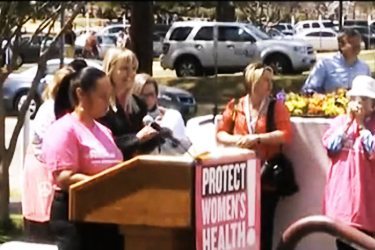During Day, Alabama Pro-Choice Activists Rally—At Night, Legislature Passes Bill to Close Clinics
The state legislature waited for activists to leave the Capitol, then voted through a bill that may close all abortion clinics in the state.

Reproductive rights activists gathered at the Alabama Capitol Tuesday to voice their opposition to a number of bills, including a targeted regulation of abortion providers (TRAP) bill that could cut off access to safe, legal abortion in the state. Anti-choice legislators ignored their concerns; later that evening, the state senate and house both met to pass the TRAP bill and send it onto the governor for his signature.
The small but vocal group that gathered in Montgomery at a protest organized by Planned Parenthood Southeast spoke out against a bill that would grant employers veto power over offering birth control coverage in insurance plans and another that proposes misleading and inaccurate “informed consent” requirements. However, the bill that most threatens safe abortion access in the state is the TRAP bill, HB 57, which would mandate physical requirements and facility upgrades for clinics offering abortions and require local hospital admitting privileges for doctors performing the procedures.
The TRAP bill is a two-pronged attack on both doctors and facilities, mandating new, expensive, and unnecessary physical requirements. The bill will force all abortion providers to submit to the Department of Public Health new architectural plans for their buildings, including expensive sprinkler systems, then be certified as ambulatory surgical centers within one year or lose their licenses.
Planned Parenthood Southeast President and CEO Staci Fox said the rally was a chance “to talk about the logic behind the bill and clarify what it will do to women,” according to the Montgomery Advertiser. This message was completely ignored by the Alabama senate. A few hours after the rally ended, at about 5 pm, the senate took the TRAP bill up for a vote, surprising the few activists who remained at the Capitol. All but one of the amendments introduced by Democratic senators were defeated, and after two hours of debate the Republicans called for a cloture vote, ending the debate with a 22-to-10.
Because of one additional amendment—requiring clinics to offer a list of medications prescribed to patients after an abortion—the bill had to be sent back to the house, which voted it through 68 to 21 at about 11 pm. Now the bill will head to Alabama Gov. Robert Bentley for signature. Bentley has already stated that he will sign the bill into law, telling anti-choice activists at a rally earlier this year that “this is what God expects us to do.”
“I am sick over the passage of this bill,” local reproductive rights activist Pamela Willis Watters told Rewire. “I knew it was coming, but it still makes me sad for women and girls in this state. My family has been in Alabama since it was a Cherokee nation. This state has a sordid past, but we are determined to make it a better place to live. The [anti-choice legislators] may win some battles, but we will eventually win the war.”
“The passage of this TRAP bill is an embarrassment to our state and a waste of taxpayers’ time and money,” added Melissa Davis, another opponent of the bill. “It’s been shown to these legislators over and over that not only is abortion one of the safest medical procedures a woman can obtain, but that our clinics in particular have exemplary safety records. I’m disappointed in our supposed representatives, and their failure to stand up for women’s rights in our state, yet again. 2014 can’t come too soon for me.”
“This legislation will make it harder to access health care, which will put women’s health in danger,” Nikema Williams, vice president of public policy at Planned Parenthood Southeast, said in a statement. “Abortion already is one of the safest medical procedures for women. The people behind this legislation really want to make all abortion illegal and inaccessible in Alabama.”
